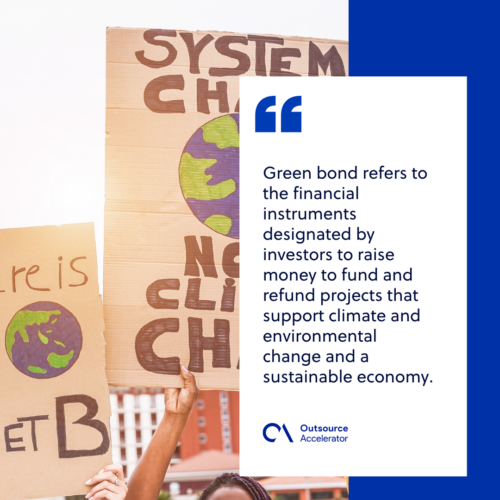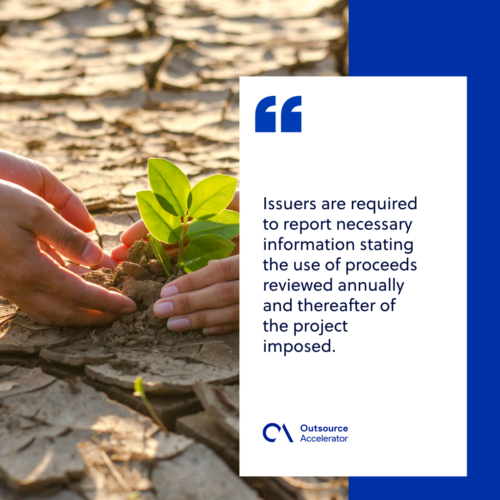Green bond
Definition
What is a green bond?
Green bond refers to the financial instruments designated by investors to raise money to fund and refund projects that support climate and environmental change and a sustainable economy.
“Green” includes conservation, sustainable resource use, waste management, clean transportation, and energy efficiency.
It is considered a debt security issued by the public and private sectors, which can benefit as it may provide tax incentives such as exemptions and credits.
International Capital Market Association (ICMA) established the Green Bond Principle (GBP) aimed at guiding issuers to consist of key components to launch a sustainable green bond.

Green Bond Principles
The Green Bond Principles (GBP) encourage issuers to have “accuracy, transparency, and integrity of information” that will be reported to stakeholders. The GBP has four components: (1) use of proceeds; (2) process for project evaluation and selection; (3) management of proceeds; and (4) reporting.
Use of proceeds
It is vital that the designated funds are solely earmarked to finance and re-finance the projects labeled as “green,” as stated in Green Bond Principles. Interpretation of “green” and “green projects” may vary depending on the sector involved and to the geography belonged. These projects include;
- renewable energy
- energy efficiency
- pollution prevention and control
- environmentally sustainable management of living natural resources and land use
- terrestrial and aquatic biodiversity conservation
- clean transportation
- sustainable water and wastewater management
- climate change adaptation
- eco-efficient and/or circular economy adapted products, production technologies, and processes
- green buildings which meet regional, national, or internationally recognized standards or certification
Process for project evaluation and selection
The investors and issuer of the green bond must compromise holding with the same objectives. Both must focus on environmental sustainability projects.
Issuers are encouraged to set transparencies to all the green bond project’s objectives, processes, strategies, and policies. They are also urged to have standardization and certification provided in the eligible green project list.
Management of proceeds
The green bond should be credited and managed by the sub-account, a sub-portfolio, or certified in the issuer’s internal processes that are linked to the lending or investment operations.
The GBP encourages issuers to have an auditor or other third party corroborate the allocation of funds and to track green bond proceeds.
Reporting
This key component is the crucial part of the Green Bond Principle (GBP). Issuers are required to report necessary information stating the use of proceeds reviewed annually and thereafter of the project imposed.
Issuers must specify the list of green bond projects, their description, objectives, the amount to be allocated, and their expected effect.

History of green bond
Back in 2007, the Intergovernmental Panel for Climate Change, a United Nations agency, published a report about climate change, its current state, future risks, and possible human action for reducing the rate of climate change.
In the same year, the very first green bond was issued by European Investment Bank. A year later, in November 2008, World Bank became the first institution to issue a green bond, raising funds from investors to support projects linked to climate change.
The green bond market started to kick off in March 2013, after the first IFC $1B green bond was launched in the global market.
Today, many countries are issuing green bonds, and the United States is the largest source. This leads to the continued thriving and the remarkable growth of the green bond market.
Growth of the green bond market
According to Climate Bond Initiative, an international organization that tracks green bond market growth, global green issuance in 2021 was estimated to be $500 billion.
Investors are now engaged in socially responsible investment, a strategy for financial return or sometimes referred to as “green investing.”
Since 2008, World Bank has been a major issuer of green bonds peaking at $14.4 billion in total. It has supported 111 green bond projects across the world.
Green bond projects have a rate of 33% in renewable energy and efficiency, 27% in clean transportation, and 15% in agriculture and land use.
However, the green bond market faces several challenges, mostly because of greenwashing, a marketing strategy of an organization providing misleading information that appears to be “green” or environmentally friendly.
Why should you invest in green bonds?
Green bonds allow investors to earn profit with an exemption from tax compliance. A growing number of institutions issuing green bonds reflects the awareness and drive to take action against climate change.
Through the issuance of green bonds, businesses can save a significant amount since green bonds are equivalent to lower costs. These savings can be a form of a dividend.
For companies, green bonds can also help establish a good reputation. With this initiative, major stakeholders will view the company as an advocate of sustainability.
For instance, a tech company like Apple issued its first green bond at $1.5 billion. It was awarded a corporate green bond of the year in Environment Finance year 2016.
Another example is Starbucks, which received a positive commendation for issuing green bonds linked to sustainable agricultural improvements.
With that said, the green bond is an integral element of sustainability that the people of the world can benefit from.







 Independent
Independent




